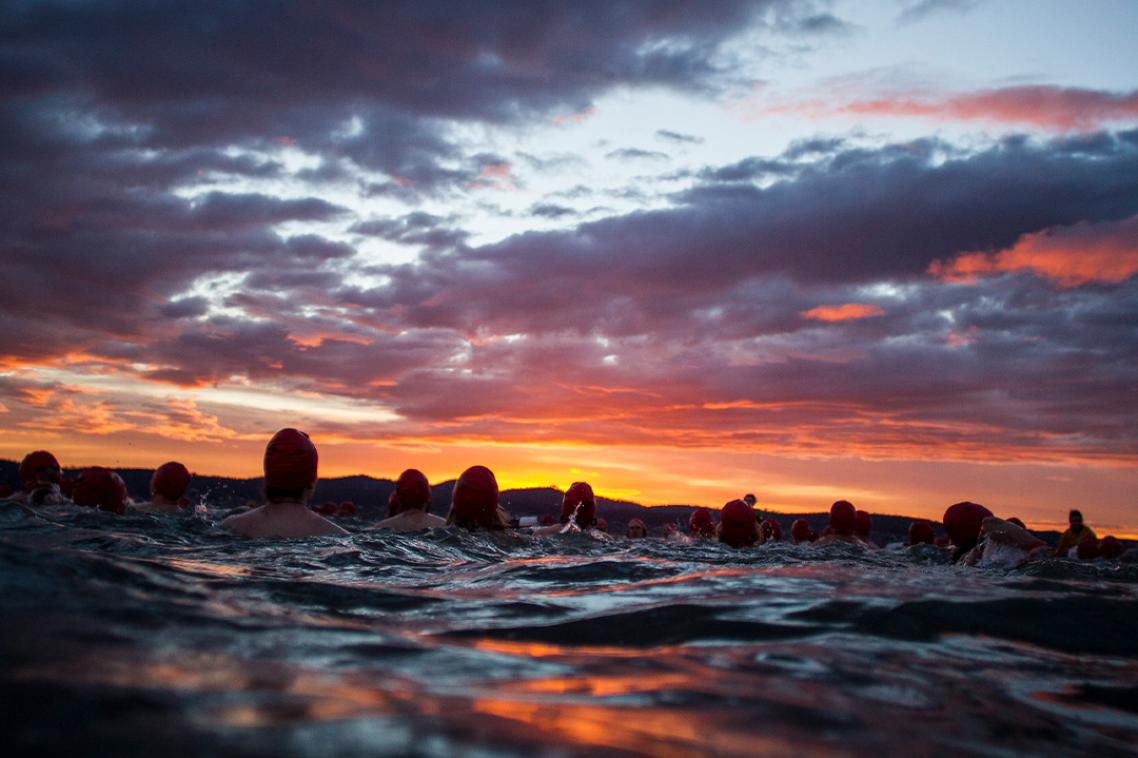Pleasure and pain: what nude sunrise swims in winter tell us about social connection

(Photo credit: Dark Mofo. )
Enduring discomfort together may bring people closer, especially when it’s mixed with a bit of joy, according to a study involving mass mid-winter river swims.
Social psychologist Dr Laura Ferris from The University of Queensland’s Business School led research into what people gain from sharing ‘aversive’ experiences.
“We hear a lot about ‘trauma bonding’ and how shared adversity brings people together, but our research showed something further,” Dr Ferris said.
“Pleasure, rather than pain, came up as the strongest predictor of whether participants in these events felt bonded with each other.”
Dr Ferris said research has previously shown aversive experiences can sometimes be pleasurable, thanks to pain activating endogenous opioids in the body that persist after the pain wears off.
The research team conducted field studies over different years at the Dark Mofo festival in Tasmania.
“The Dark Mofo solstice swim is a gathering of hundreds of strangers on the shores of the Derwent River in winter, who run naked into the freezing cold water at sunrise,” Dr Ferris said.
“We surveyed people before and after taking the plunge and found a significant boost in feelings of connection after the swim.
“People also told us about whether they felt pain and pleasure during the swim.
“Those who rated their swim as pleasurable also felt more social connection with the other people around them.”
Two years later, as well as swimmers, the researchers surveyed participants at the collective visceral art installation 150.Action by Hermann Nitsch.
“While not physically painful, this was intentionally unpleasant with the performative destruction of an animal carcass, spattered blood and very loud immersive dirge music,” Dr Ferris said.
“Of the two events, participants in the swim – although they likely experienced more physical pain – were significantly more likely to report pleasure and a stronger boost in social identification with their group.”
Dr Ferris said it was relatively common for people to seek out aversive experiences, such as eating extremely spicy food or watching horror movies.
“This is what psychologists call ‘benign masochism’,” she said.
“Some of these experiences are painful but also enjoyable.
“Our findings suggest pleasure plays a significant role in why people might chase that feeling – and this helps us feel connected to others.”
The research was published in The Journal of Positive Psychology.
Collaboration and acknowledgements
The study also involved researchers from UQ’s School of Psychology, the Australian National University and the University of Melbourne.Related articles

UQP announces winners of Mentorship Prize for under-represented writers

Nature versus nurture question addressed in landmark study
Media contact
UQ Communications
communications@uq.edu.au
+61 429 056 139
